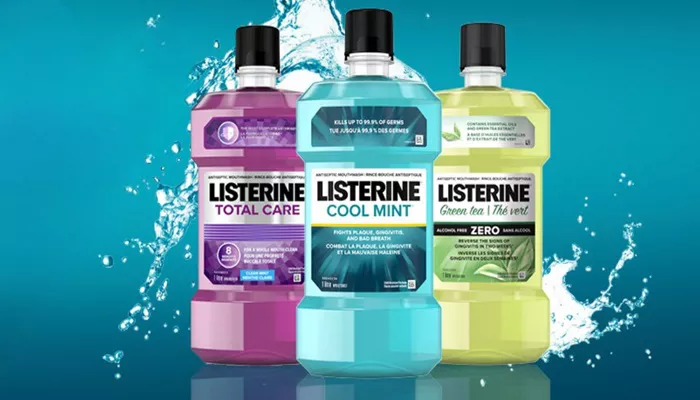Periodontitis is a serious gum disease that can lead to tooth loss and other health complications if not managed properly.
One effective way to prevent periodontitis is through proper oral hygiene, which includes the use of mouthwash. Listerine, a well-known antiseptic mouthwash, has been clinically proven to help reduce the risk of developing periodontitis. This article explores how Listerine works, its active ingredients, and the specific ways it can help prevent this condition.
What Is Periodontitis?
Periodontitis is an advanced form of gum disease that occurs when gingivitis (the initial stage of gum disease) is left untreated. It is characterized by inflammation of the gums, loss of connective tissue, and bone loss around the teeth. This condition can result in:
Tooth Mobility: Teeth may become loose due to loss of bone support.
Gum Recession: Gums may pull away from the teeth, creating pockets that can become infected.
Bad Breath: Persistent bad breath is often a symptom of periodontal issues.
Pain and Discomfort: Inflammation and infection can cause significant discomfort.
Preventing periodontitis is crucial for maintaining oral health and overall well-being. Regular dental check-ups, proper brushing, flossing, and the use of mouthwash like Listerine are essential components of an effective oral hygiene routine.
see also: What Antibiotics Are Used to Treat Periodontal Disease?
The Role of Listerine in Oral Hygiene
Listerine was developed in 1879 and has been a trusted name in oral care ever since. It contains a blend of essential oils that provide antimicrobial properties to combat the bacteria responsible for plaque buildup and gum disease.
Here’s how Listerine contributes to preventing periodontitis:
1. Antimicrobial Action
Listerine contains several active ingredients that work together to kill harmful bacteria in the mouth:
Eucalyptol: This essential oil has strong antibacterial properties that help reduce plaque formation.
Menthol: Provides a refreshing taste while also contributing to the antimicrobial effects.
Thymol: Another essential oil known for its ability to inhibit bacterial growth.
Methyl Salicylate: This ingredient has anti-inflammatory properties that can help soothe irritated gums.
These ingredients work synergistically to eliminate up to 99.9% of germs that cause bad breath, plaque, and gingivitis. By reducing bacterial load in the mouth, Listerine helps prevent the development of periodontitis.
2. Plaque Reduction
Clinical studies have shown that using Listerine can significantly reduce plaque buildup:
5x More Effective than Flossing: Research indicates that rinsing with Listerine is five times more effective than flossing alone at reducing plaque above the gumline.
Long-term Efficacy: Regular use of Listerine has been shown to decrease dental plaque by 22.2% and gingivitis by 28.2% over six months.
This reduction in plaque is crucial because plaque accumulation is a primary contributor to both gingivitis and periodontitis. By controlling plaque levels, Listerine helps maintain healthier gums.
3. Gingivitis Prevention
Gingivitis is often a precursor to periodontitis. By effectively managing gingivitis, Listerine plays a vital role in preventing its progression into periodontitis:
Clinical Studies Support Gingivitis Control: Studies have demonstrated that using Listerine as part of a daily oral hygiene routine can lead to a 21% greater reduction in gingivitis compared to brushing and flossing alone.
Regular Use Recommended: For optimal results, it is recommended to use Listerine twice daily as part of your oral care routine.
How to Use Listerine Effectively
To maximize the benefits of Listerine in preventing periodontitis, follow these steps:
1. Brush Your Teeth First
Before using Listerine, brush your teeth thoroughly with fluoride toothpaste. This step removes food particles and plaque from the surfaces of your teeth.
2. Rinse with Listerine
Measure out 20 ml (about 4 teaspoons) of Listerine.
Swish it around your mouth for 30 seconds. Make sure it reaches all areas, including between your teeth and along the gumline.
Avoid swallowing the mouthwash; it is meant for rinsing only.
3. Do Not Rinse with Water Immediately After
After using Listerine, avoid rinsing your mouth with water or eating for at least 30 minutes. This allows the active ingredients more time to work effectively on your teeth and gums.
Additional Oral Care Tips
In addition to using Listerine, consider these practices for optimal periodontal health:
Floss Daily: Flossing helps remove food particles and plaque from between your teeth where toothbrushes cannot reach.
Regular Dental Visits: Schedule dental check-ups every six months for professional cleanings and assessments.
Healthy Diet: Maintain a balanced diet rich in vitamins and minerals that support gum health, such as vitamin C.
Avoid Tobacco Products: Smoking or chewing tobacco increases your risk for gum disease significantly.
Conclusion
Listerine plays an essential role in preventing periodontitis through its powerful antimicrobial action, ability to reduce plaque buildup, and effectiveness in controlling gingivitis. By incorporating Listerine into your daily oral hygiene routine along with regular brushing, flossing, and dental visits, you can significantly lower your risk of developing periodontal disease.
Related topics:

